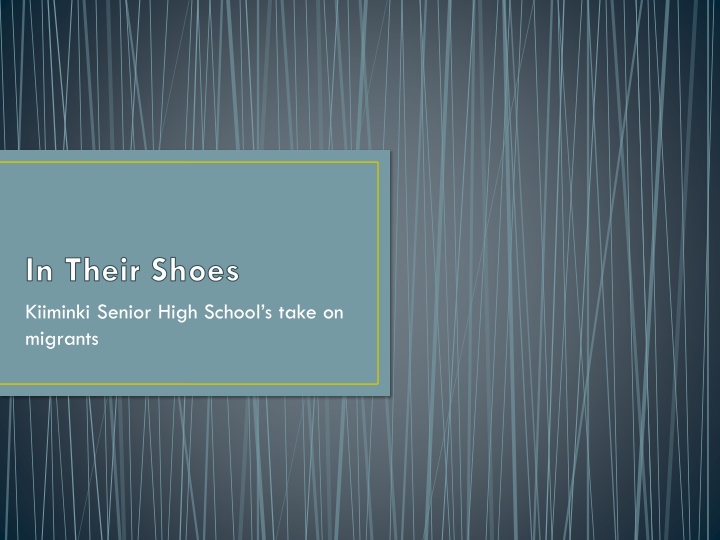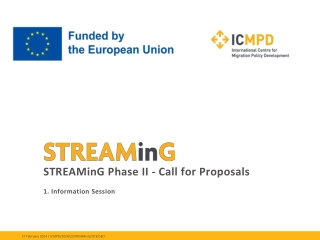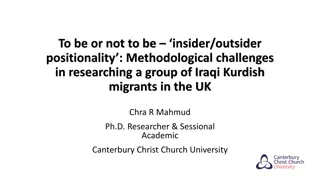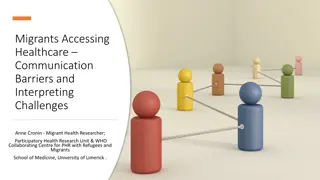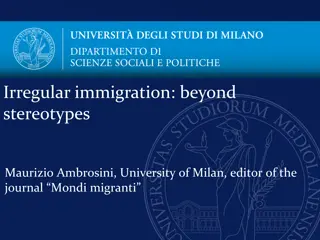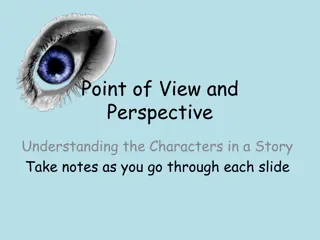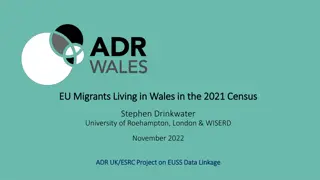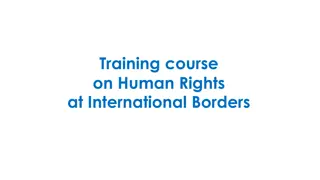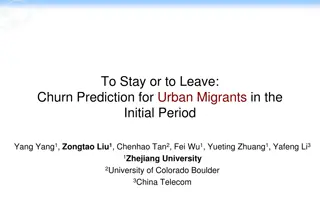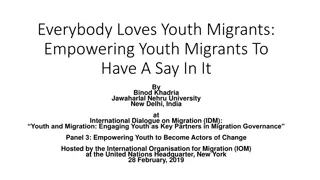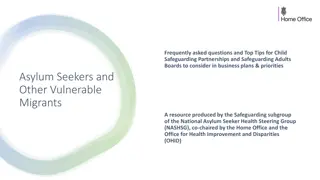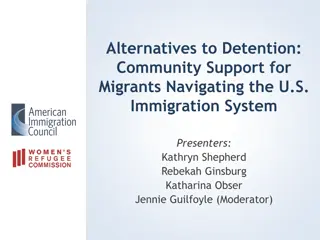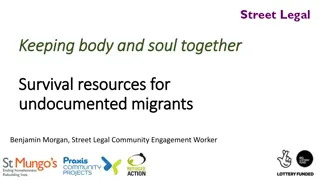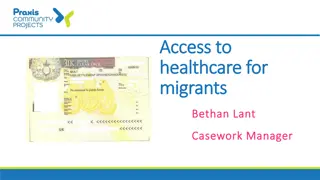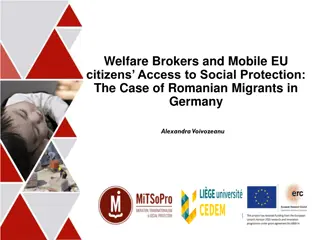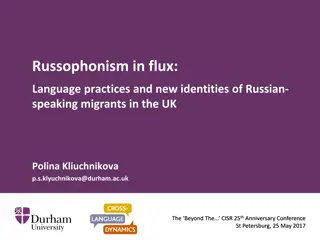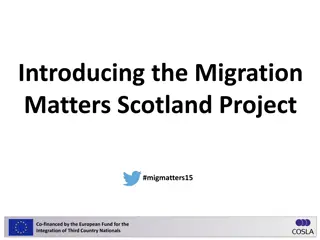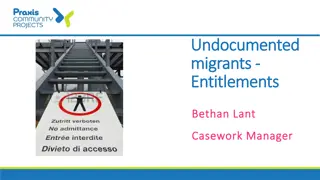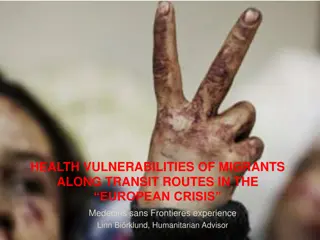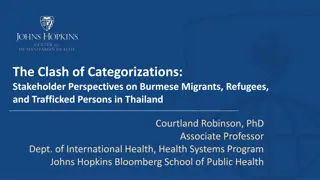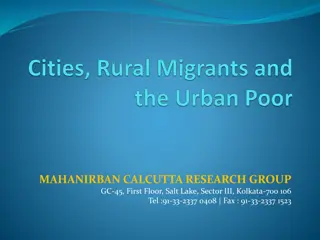Students' View on Migrants: A Profound Perspective
In October 2017, students at Kiiminki Senior High School engaged with migrants from Iraq, Afghanistan, and Somalia, gaining insights into their cultures and experiences. Through workshops and discussions, students reflected on their perceptions, acknowledging the bravery and resilience of refugees. The encounters led to personal growth and a deeper understanding of human connection and respect. Tags: - Migrants - Students - Cultural exchange - Refugee perspectives - High School
Download Presentation

Please find below an Image/Link to download the presentation.
The content on the website is provided AS IS for your information and personal use only. It may not be sold, licensed, or shared on other websites without obtaining consent from the author.If you encounter any issues during the download, it is possible that the publisher has removed the file from their server.
You are allowed to download the files provided on this website for personal or commercial use, subject to the condition that they are used lawfully. All files are the property of their respective owners.
The content on the website is provided AS IS for your information and personal use only. It may not be sold, licensed, or shared on other websites without obtaining consent from the author.
E N D
Presentation Transcript
In Their Shoes Kiiminki Senior High School s take on migrants
In Their Shoes Migrants from Iraq, Afghanistan and Somalia visited Kiiminki Senior High School in October 2017. They hosted workshops on the alphabets of Dari and Arabic as well as Iraqi culture. There was also a panel discussion in which our students could ask questions. Afterwards we asked our students to write on this hands-on experience with the new arrivals. We also wanted to know what our students think about migrants in general. What follows is a sample of the students responses.
Walk past them quickly and avoid eye contact. Those were pretty much my exact thoughts when I saw some refugees in the streets of Oulu. I didn t know if they were actually refugees but that s what I thought. I didn t intend to be rude or anything, I was just scared that they might do something bad to me. Spoiler alert: they did not. They did nothing to me but I had always believed that refugees were bad people and didn t have any right to be in my country. In that moment I realized how selfish I was. I knew that I had to imagine being in their position. For me, it was really hard to try to step in their shoes. When you have everything you want in life, it s hard to imagine being someone who doesn t really have much. I can t even imagine how it feels like to leave your family and move to foreign country you know nothing about. The language is hard, the residents are weird and the culture is completely different. Refugees are brave and strong because they can get through it. I know that I couldn t, even if I didn t have any choice. So, I don t respect refugees just because they re brave. I respect them because they are humans and humans should respect other humans.
It took me a couple of years to understand them. I still dont clearly know what refugees have gone through but I feel like I understand them better than I did before. I have watched a plenty of documentaries about refugees and met a few personally. I was really nervous because I didn t know what to say but it was actually a nice experience. The refugees I met were so friendly to me. I know that a lot of Finns are against refugees and think that closing the borders from immigrants is an option. They think like that because they haven t met any refugees personally. If they did, their opinion about refugees would change completely. Some people may think that all refugees are terrorists. Just because one person is bad, you can t expect that all the others are too. If there s a terror attack somewhere, suddenly people think every person in the same race is a terrorist. People should start focusing on the good people. There happens bad things in this world every single day but we can t live in fear. We all have to respect each other and enjoy life. Lyydia Pyykk nen
In Their Shoes Migrants from Iraq, Afghanistan and Somalia visited Kiiminki Senior High School in October 2017. They hosted workshops on the alphabets of Dari and Arabic as well as Iraqi culture. There was also a panel discussion in which our students could ask questions. Afterwards we asked our students to write on this hands-on experience with the new arrivals. We also wanted to know what our students think about migrants in general. What follows is a sample of the students responses.
Imagine if you had to leave your home country behind and start a new life somewhere where you didn't know anyone. You would have to say goodbye to your home, work, friends and even your family. After a long and difficult journey to a new country, you would face many challenges, from learning the local language to finding a job. Why would anyone do that? There are many reasons for one to emigrate. Wars, persecutions, famine, insecurity and natural disasters force people to apply for asylum in other countries, for example, in Finland. Some people move to Finland not because they have to, but because they want to do so. They may come to Finland to work or study. Immigrants in Finland need to adapt to many things. Learning Finnish can be hard and the Finnish culture may be totally different from their own. In winter it's cold and dark and some of the habits Finnish people have, such as not wanting to make small talk, can seem strange to foreigners. Getting a job can be harder for immigrants than it is for Finnish people because immigrants may have inadequate Finnish skills and the employers often have prejudices regarding them. I think it's very important that immigrants integrate properly into the Finnish society. If people have nothing to do and they don't know what the future holds for them, they get frustrated and start feeling like the society has abandoned them. In that situation they may adopt extreme ideologies. On October 20th2017 Kaleva wrote about Startup Refugees, a network that helps refugees get employed and start their own companies. In my opinion that is a great idea because not only does it provide refugees a living and something meaningful to do but it also helps them integrate and become active members of society.
I think that at the end of the day Finland needs immigrants. Finnish people are getting older and less babies are being born. Without immigration our population would stop growing. We also need more taxpayers to provide for the growing amount of elderly, resigned people. There seems to be a lot of negativity towards immigration, especially on the internet. There are people who want to ban immigrants and send back the ones already living here. I think that we should all consider this: if something happened and you couldn't live in Finland anymore, what would you do? Where would you go? Maybe you would move to Sweden or maybe you would try to get as far from Finland as possible. Anyway, you would leave your country and try to find a better life somewhere else. I don't think we should judge immigrants for doing that because after all, we would do the same. Elsi Karjalainen
In Their Shoes Migrants from Iraq, Afghanistan and Somalia visited Kiiminki Senior High School in October 2017. They hosted workshops on the alphabets of Dari and Arabic as well as Iraqi culture. There was also a panel discussion in which our students could ask questions. Afterwards we asked our students to write on this hands-on experience with the new arrivals. We also wanted to know what our students think about migrants in general. What follows is a sample of the students responses.
Nowadays people are starting to get used to the immigrants at least here in Finland. They are bringing life, new cultures and above all, they mix up Finland's population which has stayed long as homogenous. Finnish people are usually stolid and reserved especially towards new things. And when you combine these two things, it's no wonder some people don't react very great towards immigrants immediately. But it's time to mix up Finland's population. The population of Finland is also decreasing. Immigrants are bringing us new workforce which we need. Immigrants have a chance to start over here. They have the possibility of better education. They are safe, there is no war or they aren't persecuted because of their beliefs. Of course, they can have new problems here, like the language or getting a good job or finding people to lean on when you need it. But they are no longer in a danger of life. I also understand why some people are sceptic. Terrorist attacks increase the fear and in recent years there have been many of them. Information and finding out about immigrants and also terrorist attacks might decrease the fear. Often, it's not the immigrants who commit the crimes like terrorist attacks. And when it is, the media and people easily exaggerate and make it sound like it's always the immigrants. Immigrants or refugees without permission cause some people to form prejudices too, I think. Also, the refugee crisis in 2015 might still have an influence on some people. Some people, including me, think that there should be more women and children coming here. I understand that the travel isn't easy, but isn't there any ways to help them or make the travel any easier for the women and children?
There are ways to make people feel safer with immigrants. Proper background-checks for the protection seekers for example. Also, we should emphasize interaction rather than confrontation, pitting against each other. And we should remember important things like social integration, equality and love of neighbor, naturally. Many people have started to deal better with the immigrant situation nowadays. Which is partly because immigrants are already a familiar thing in the street and social life. People have also got to know them through hobbies, jobs and schools, which extract prejudices and affects on their opinions about other immigrants. Negative attitude towards immigrants is partly because of stereotypes and generalization. Aada-Maria Lauri
In Their Shoes Migrants from Iraq, Afghanistan and Somalia visited Kiiminki Senior High School in October 2017. They hosted workshops on the alphabets of Dari and Arabic as well as Iraqi culture. There was also a panel discussion in which our students could ask questions. Afterwards we asked our students to write on this hands-on experience with the new arrivals. We also wanted to know what our students think about migrants in general. What follows is a sample of the students responses.
First of all, we who live in a safe country without wars, hunger or poverty, will never understand the true pain of immigrants. They were forced to leave their beloved country, and start a new life somewhere far from home. We Finns will never understand what they are willing to go trough to keep themselves and their families safe from war, poverty, racism, and hunger. I myself have lived all my life in a safe country which has never confronted me with threats of war or danger. In some ways, I feel little bit bad for taking everything my country has to offer for granted. I think that everyone who is seeking shelter in our country, should be welcomed to seek refugee here. Most of the people who have to do that, are genuinely just trying to keep their loved ones safe from harm, and they should not be disrespected, or profiled by their backgrounds. Of course in the midst of these regular, warm hearted people, sometimes lurk the most evil monsters, which we have named terrorists. Now i'm not saying that I connect all immigrants with terrorism, of course not, but the fact is that the countries which breed most of the known terrorists are the lands which people are immigrating from. I understand that the wars that are fought on these lands breed hatred and bitterness in some people, and that is to some point justified. I would be enraged too if someone attacked my home and started attacking the people that I care about, but these things do NOT in any way justify the actions of terrorists. The fact that terrorist attack innocent civilians in their heinous acts of hatred is incomprehensible. What do they hope to achieve, by killing innocent people who are trying to live their lives, and who have nothing to do with the wars which drove them to madness.
That is the dark side of immigration. By trying to help the people in need of assistance, we might open the door for the big bad wolf, that is out there to hurt us. And still it is our responsibility as humans, to try to help immigrants achieve a happy life inside our country. Why is it our responsibility? Well think about this. We live happily in our country and block the immigrants from coming to our land, but will that happiness last? What if we will someday be in their place, and will be needing help of other people? Why would they help us if we do not help them? The truth is that 99,9% of these immigrants who seek shelter in other countries are regular, good people, and the 0,01 percent is the risk that we are willing to take, to show everyone else that we are not like the people who cause immigration. That we are not like the terrorists. That we are not bad people. We are Finns! And on my behalf, I welcome refugees in Finland. I'm proud if we can help you achieve the happiness that you seek. Tuukka Malinen
In Their Shoes Migrants from Iraq, Afghanistan and Somalia visited Kiiminki Senior High School in October 2017. They hosted workshops on the alphabets of Dari and Arabic as well as Iraqi culture. There was also a panel discussion in which our students could ask questions. Afterwards we asked our students to write on this hands-on experience with the new arrivals. We also wanted to know what our students think about migrants in general. What follows is a sample of the students responses.
Immigration has been in the limelight lately. Some people support it, and some are against it. Is there a right way to relate to a concern as big as immigration? Is it even a concern? It depends. There are so many things to look at, so many points of view and so many things that have to do with it. Like in almost all things there are good and bad sides about immigration. Good sides such as more culture and manpower and bad sides like more chance of a terrorist attack of some sort. In a country like Finland we need a richer culture and more manpower. But with refugees it s possible that some terrorists have infiltrated among the refugees and that is raising fear these days since radical Islamic organizations like Isis have become public. I bet we all have read or heard about some Immigrant that has robbed the small town s store or raped a woman on her morning jog. What about the Finnish man shooting his own children or robbing the bank? No one thinks that one Finnish man s wrongdoings make all Finnish men bad. So why does it feel that way about immigrants? It is true that sometimes they turn out to be terrorists or otherwise just violent. People think the easiest way to prevent terrorist attacks or murders or robbery is to send all immigrants away. People tend to think easy and not about what is right. But then what is right? We know for a fact that some of these immigrants are refugees and that they have left their country in fear of losing their life. If they were sent back to their country, they would be in danger or maybe even recruited by Isis.
I Feel like sometimes Finnish people are boring, quiet and a bit rude. I have met some immigrants and most of the time they turn out to be nice and very talkative people. I think the immigrants are what could save Finland from becoming this bland depressed country. Lukas Pohjola
In Their Shoes Migrants from Iraq, Afghanistan and Somalia visited Kiiminki Senior High School in October 2017. They hosted workshops on the alphabets of Dari and Arabic as well as Iraqi culture. There was also a panel discussion in which our students could ask questions. Afterwards we asked our students to write on this hands-on experience with the new arrivals. We also wanted to know what our students think about migrants in general. What follows is a sample of the students responses.
Is immigration a good or a bad thing? It really isnt black and white. Its hard to form an opinion when there are so many sides to this case, and immigrants presence haven t impacted my life that much. I still think that it s our moral responsibility to help other people who need help, and I don t think that many of us western people quite understand what they are going through. There are many reasons for immigration; It could be that some of immigrants are escaping the war or persecution or intolerable circumstances. Some of them have their spouse or family member living in another country, or some of them are moving voluntarily in the hope of a better life. The reasons are always very personal. There is a lack of labor in Finland so the immigrants are a very helpful addition, mostly because they end up doing the jobs locals don t want to or can t do. The immigrants usually do longer workdays with a lower salary, and I find it unfair and it s not equal at all. Are they treated worse than locals because of their heritage? Yes, and it s not okay and rather I think they are being exploited.
Some immigrants that were living in Oulu visited our school in September and they told us that they found it kinda difficult to communicate or chat with Finns. It s probably because Finnish people are rather shy and reserved most of the time. Of course there are exceptions, but you get the point. I think that if we Finns were less reserved and more open for different kinds of people we would broaden the understanding of different cultures, which would be great. That would be one of the perks of immigration. However people tend to find immigrants threatening which complicates their adapting to a new country. I think that we all should stop and take a moment to imagine ourselves in their shoes: What it feels like to lose your home, moving to a totally different country with a totally different culture and not knowing anyone. The situation is better in here than for example in the USA where the new president has deported a lot of former immigrants causing many families to break, and it has also increased racism. My opinion is that immigrants and refugees should get treated equally with everyone. It is morally right and they can bring a lot of cultural richness and diversity to Finland. Aino Reponen
In Their Shoes Migrants from Iraq, Afghanistan and Somalia visited Kiiminki Senior High School in October 2017. They hosted workshops on the alphabets of Dari and Arabic as well as Iraqi culture. There was also a panel discussion in which our students could ask questions. Afterwards we asked our students to write on this hands-on experience with the new arrivals. We also wanted to know what our students think about migrants in general. What follows is a sample of the students responses.
There are wars and conflicts going on somewhere. Soldiers and rebels are arguing and fighting each other. These wars and and conflicts affect innocent civilians. Civilians are not only in a huge danger, but these soldiers and rebels are usually recruiting new warriors. Imagine a group of soldiers coming to your home and threatening possibly you, your father and brothers. They will torture you or kill your family members if you don t accept their invitation to join their forces. When I m now thinking what I would do in that kind of situation, the best option seems to be to leave my country. I see that leaving the place where you have grown up and experienced so much must be extremely difficult. It s a big decision to leave everything behind. But people s lives and safety are more important than any places or buildings. When you have left your home and you are traveling around the globe, seeking asylum, you may experience racism. You may experience hate. But you will also meet kind people. If you look to Facebook or Twitter, it seems like majority of Finns are against immigration. They are shouting Finland for Finns! and Close borders! . That is not the truth. They are only loudest part of us. It s a little but loud group of people who want immigrants away from Finland. Real majority of Finns is not as offensive as these Facebook and Twitter people. All Finns don t like immigrants and
refugees. And they dont have to. The thing that matters is that even if people dont like immigrants, they know that we must offer refugees asylum. It s part of humanity. Some Finns are afraid of immigrants. They think that all immigrants are dangerous or aggressive. That is because of the gap between our and immigrants culture. We don t understand they properly and they don t understand us. Finns are so quiet that immigrants may think He doesn t say anything, he is angry. But it s only a part of our culture. We don t talk too much, if the person we are talking to isn t a friend or family member. Personally I think that Finland needs more immigrants. It would be good for Finns to get to know other cultures. We live here in Northern Europe, where only cultures we see are Finnish and maybe Swedish, Estonian and Norwegian cultures. The more we know, the more we understand about the world. Jaakko Berg
In Their Shoes Migrants from Iraq, Afghanistan and Somalia visited Kiiminki Senior High School in October 2017. They hosted workshops on the alphabets of Dari and Arabic as well as Iraqi culture. There was also a panel discussion in which our students could ask questions. Afterwards we asked our students to write on this hands-on experience with the new arrivals. We also wanted to know what our students think about migrants in general. What follows is a sample of the students responses.
Immigration is a current phenomenon Europe is facing. There are too many refugees coming to seek for help and we have not prepared for it well enough. But even though it can be considered as a risk, it is also an opportunity and important for our future. Why should we allow refugees and emigrants to come to our country? I think it is important to help those in need because you will never know when you will need it yourself. If you don't help them, why would they help you? And in the future, we will need immigrants. For example, the population of Finland is starting to get older and we will need immigrants as labour force. Immigrants also make Finland more international and we learn to respect other cultures. People have mixed opinions on immigration. People often think about refugees when it comes to immigration but emigrants are also immigrants. They just have a different reason to come here. Some people see immigrates as some sort of animals but they're human, just like us. When forming your opinion on immigration you have to be very careful because the internet is full of false information especially in this particular topic. Many people have a pretty strong opinion which can have an impact on your opinion. Media spreads twisted truths about refugees and picks on individual occasions. I think this is unfair for refugees because most of them are good people.
Attitudes towards refugees and immigrants in general can be harsh. It shows up as discrimination and negative thoughts on immigration. It can be hard to adjust to foreign people living in your country but you shouldn't hate them because they had no option. They probably would've not come here if they didn't have to. Maybe our attitudes would be more tolerant if we talked to them and learned about their backgrounds. You have to hear their story from their point of view. Imagine this situation: You have just left your homeland and you're living in a foreign country far away from your family. In addition, you have to face negative attitudes and behaviour targeted towards you. Doesn't sound good, right? The situation is better for emigrates because they come here voluntary. In conclusion I think immigration is a good thing and we should help as many refugees as possible. They are the ones that will help us in the future. We also need to change our attitudes towards immigrants and treat them as normal human beings. And to those who don't understand why immigrants come here: What would you do if you were in their shoes? Daniel Hautala
In Their Shoes Migrants from Iraq, Afghanistan and Somalia visited Kiiminki Senior High School in October 2017. They hosted workshops on the alphabets of Dari and Arabic as well as Iraqi culture. There was also a panel discussion in which our students could ask questions. Afterwards we asked our students to write on this hands-on experience with the new arrivals. We also wanted to know what our students think about migrants in general. What follows is a sample of the students responses.
Nowadays when speaking about immigration in Europe people tend to mean immigration from North-Africa and Midle East. This began when rising numbers of people started to travel to Europe manly from majority muslim countries such as Syria, Afghan, Irac, Somalia and Nigeria. This was caused mainly because Muammar Gaddafi, leader of Libya was killed in 2011 by rebels supported by United States and other western nations. Libya fell into chaos and stopped working as a road block for migrants who wanted passage to European welfare states . Islamic Immigration is in my opinion bad for Europe because it has lots of negative effects. The most immediate effect is the rise in violence and crime. Sweden has gained a whole new kind of crimes such as grenade attacks and gang rape. U.K has seen an incredible rise of acid attacks and sexual assaults, most noteably the horrible case of Rotherham child abuse scandal . Similiar trends can be seen in other EU countries like Germany (as in the case of Cologne's mass sexual assaults in the new year's night of 2015/2016 ) and France (as in Charlie hebdo shooting ).
Another effect that worries me is the birth rate among muslim migrants. Since immigrants make roughly eight kids on average per family while european birth rate is spiraling down. What this means is in a generation many european nations will be majority muslim (Germany and Sweden are looking pretty overwhelmed already ). These migrants and their children usually don't assimilate well to western countries like I have shown earlier. The result of this is that the host country's original peoples will be outbred by migrants which will result in a complete loss of county's identity and culture. Things don't have to go like this though: countries like Hungary and Poland have refused mass migration to their countries and combat dropping birthrates by adding policies which increase childbearing within their country. I don't hate anyone but I am worried of the existence of my and European countries and cultures. Instead of taking migrants we should focus on helping stabilize the countries the migrants are coming from. A good first step for the western nations would be stopping the foreign invasions to Middle East and stop trying to spread democracy by taking down foreign leaders. Also stop sending foreign aid to countries where it just increases local birthrate and puts burden on local agriculture and thus creating more migrants. Paavo Huttunen
In Their Shoes Migrants from Iraq, Afghanistan and Somalia visited Kiiminki Senior High School in October 2017. They hosted workshops on the alphabets of Dari and Arabic as well as Iraqi culture. There was also a panel discussion in which our students could ask questions. Afterwards we asked our students to write on this hands-on experience with the new arrivals. We also wanted to know what our students think about migrants in general. What follows is a sample of the students responses.
There are over 65.6 million forcibly displaced people worldwide, 10 million stateless people, and 22.5 million people with a refugee registration, with only 189,300 of them resettled. That makes 99.2% of the refugees still looking for a new home. 55% of refugees worldwide came from either South Sudan, Afghanistan or Syria. In 2015, there were 32,477 asylum applications based in Finland. So now you know the scale, but do you really know what is it like to be In Their Shoes? 18th October, a group of local immigrants visited our school and held 3 different points, each point having a different activity, different people, different stories. I think that the stories that were told that day really made the students and the staff of our school think about the subject. Some of us tried to imagine ourselves In Their Shoes, but it is rather impossible to truly understand what they've been through and what they're going through. My mother is Indonesian, and I was born in Jakarta, but my father is Finnish and I was raised here since i was 2 months old. I've never been considered as a refugee, because the difference between me and a refugee is that I never had to leave really, but about them? Most of them were forced to leave because of their religion, war, lack of education, yet still it doesn't mean that they wouldn't like to go back to their home countries, to their own cultures. I know a lot of refugees,
and after the school visit, I even made some new friends. They seem to love the Finnish cold weather, which I find surprising, but I got to ask one of my friends what keeps him going and he said: "The dream of returning back home to his family as soon as possible, hopefully well educated". That's called faith. The wars don't seem to come to an end anytime soon as much as we hope they would, so there will be more refugees, no doubt. Our role is to make them feel welcome, and treat them like we'd like them to treat us if we were refugees in their home country. Make new friends! Marko Jokela
In Their Shoes Migrants from Iraq, Afghanistan and Somalia visited Kiiminki Senior High School in October 2017. They hosted workshops on the alphabets of Dari and Arabic as well as Iraqi culture. There was also a panel discussion in which our students could ask questions. Afterwards we asked our students to write on this hands-on experience with the new arrivals. We also wanted to know what our students think about migrants in general. What follows is a sample of the students responses.
What is immigration? Is it a threat to the country? Is immigrant an alien? Are they going to steal our jobs? These questions popped up when I searched information about immigration in Google. Why people are so afraid about this subject? Immigration isn t a new thing in the modern world we re living on now. People are still talking about it like they ve never even heard of immigration before. Immigration is a thing that have been among us a very long time. Throughout the times people have moved around the world from country to country. But some people does not realize that. Immigration means that you move out of your country to another. It doesn t mean that the reason of moving must be war or terrorism or any kind of a risk that a person is categorized to immigrant. Whatever the reason of moving is, person who moves to another country is an immigrant. Example Teemu Sel nne is a Finnish hockey player who moved to US with his family, so they became immigrants. Immigrant can be anyone from anywhere. There are many people who are scared of immigrants. Usually people mixes up immigrants and refugees. There are different stereotypes that makes some people generalize those to everyone. Some of those makes people scared of certain human races. Example they think that if you re black, you must be a thief and you must like rap. But is Barack Obama a thief? Or Morgan Freeman? No, but they can
like rap, but so does many other people, not just black people. Some of Finnish stereotypes are that everyone drinks coffee and eats salmiac all the time and that we re small talkers. But that s wrong, not all of us like coffee or salmiac but the rest of that is true, we don t talk much. But all in this world isn t just hate and fear luckily. Technology have helped a lot spreading the information about immigration to almost everyone. Social media gets people to see different cultures around the world. Many people have friends from different countries, including myself, and that makes people more aware of the real habits of that country s culture. When more and more people get friends from around the world, more people comes together, and stereotypes disappear. In my opinion our world won t work if there s no immigration at all. We all live in this planet and we re all its citizens. No one s better than another, we re all the same and we must work together to take care of this planet. Therefore, immigration helps the progress of making all of us dwellers of the same world. Different cultures meet each other and learn from each other s habits. Difference scares people because they might don t know about other cultures. That s why everyone keeps still talking about immigration, so people get to know of other cultures and realize that they re not a threat. It s important to talk about these things so stereotypes and discrimination decreases in the world. So, immigration is a good thing and it should never stop. Mirka Saapunki
In Their Shoes Migrants from Iraq, Afghanistan and Somalia visited Kiiminki Senior High School in October 2017. They hosted workshops on the alphabets of Dari and Arabic as well as Iraqi culture. There was also a panel discussion in which our students could ask questions. Afterwards we asked our students to write on this hands-on experience with the new arrivals. We also wanted to know what our students think about migrants in general. What follows is a sample of the students responses.
"We had a beautiful city before ISIS came", said by one of the refugees who visited our high school couple weeks ago. Immigration has been a big topic in Finland for past few years. In my opinion, it s a two-way street; problems including starvation and wars, but there is a potential increase in criminality. We still should help those who need it. Firstly, a lot of people are under starvation, a good example of this is Iraq. I think here in Finland people can't understand starvation and how big of a problem it is in middle-East. Many people in Finland are really sceptic about immigrants who come from middle-East and I can totally understand the awareness that people have. My sister is dating a guy named Ali and he is really funny guy and he is not a terrorist, although many Finnish people could think he is. He had to leave his country because of a pogrom. Ali loves Finnish culture and he wants to learn more of it every day. I think that everyone can come, if they are ready to work and learn Finnish culture, like Ali. :) Immigration is a matter of safety. In couple years Finland has received thousands of immigrants. In my opinion Finland can try to decrease the chance of potential terrorist attack. The more people come without passport, the more criminality there will be. We need to know who we can allow here. Overall I think that Finnish people should be more open-minded about immigrants. Antti Kemppainen
As we all know, immigration means moving from a country to another. Usually people leave their country in hopes of a better life, studies or work, but there are a lot of cases in which people don t want to leave, but have to. To move to a different country, you need a residence permit. Sadly, there are people who travel to a country and seek a residence permit but don't get one. This means that they don t legally have the right to live in the country, and could be ordered to leave. These people are called refugees. What do I think of all of this? Is it a good thing that immigration is possible? In my opinion, yes. I think it s very important to have an opportunity to move to a different country, especially if you for some reason can t live in your country or if living there isn t safe. It is a human right to be able to live in a safe environment, so why would immigration be a bad thing? I know there s a lot of people who see it as a bad thing, but personally, I do not. I think allowing immigration and seeing it as an okay thing is one step closer to a better world. As for my opinion in refugees, I think it s sad that something like that happens. It is a thing that we, as citizens, can t really do anything about. If a refugee does not have any or enough evidence that living in their home country isn t safe for them, they will most likely be asked to leave the country. Tea Korhonen
